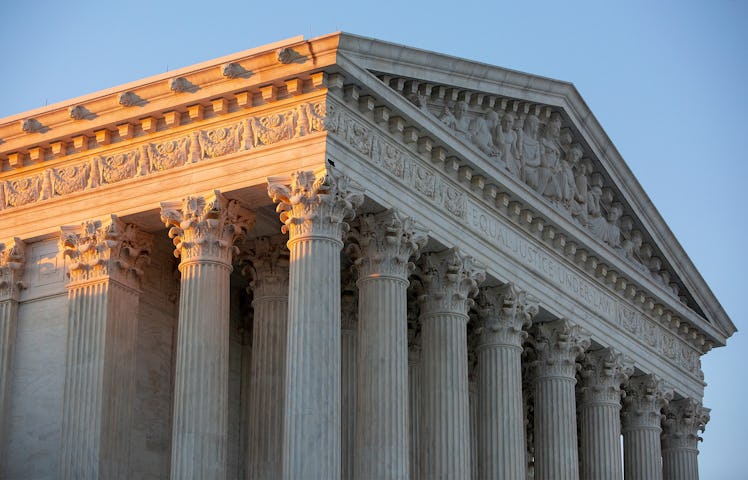
The Process To Confirm A Supreme Court Justice Isn't Complicated, But It Can Be Long
On July 9, President Donald Trump nominated Judge Brett Kavanaugh to fill the Supreme Court vacancy left by Justice Anthony Kennedy, whose retirement takes effect on July 31. The president's decision has been lauded by many, and criticized by others, as the next justice could have an enormous impact on the future decisions to come out of the court, specifically when it comes to abortion rights. However, no matter what your stance is when it comes to Trump's pick, Kavanaugh won't immediately fill the seat. So what's the process to confirm a Supreme Court justice? Here's what you need to know.
Now that President Trump has made his nomination, Kavanaugh will be referred to the United States Senate first, where the Senate Judiciary Committee will hold hearings for the judge to provide testimony and answer questions from members of the panel. According to Fox News, the hearing can take multiple days, but once it's complete, the committee will then vote on Kavanaugh, and refer him to the full Senate for consideration. The committee can report him favorably, unfavorably, or without recommendation.
Finally — if he makes it that far along in the confirmation process — Kavanaugh will have to receive a simple majority of 51 votes of approval before his nomination becomes official. There are currently 51 Republican senators and 49 Democrats who will have to weigh in on the judge, but in the case they reached a tie, Vice President Mike Pence would be the deciding vote, who would likely choose Trump's pick. The whole thing can take a long time: the process for Neil Gorsuch, who was confirmed to the Supreme Court in early 2017, took over two months.
But considering Kavanaugh's long history as a judge — he's written nearly than 300 opinions as a D.C. Circuit Court judge, per CNBC — the confirmation could take a long time, as critics will want to review as much as possible.
Although Kavanaugh will have to go through a bit of a lengthy process before he's confirmed as a new justice, Trump seemed pretty confident in his selection. On July 9, he said of the judge:
The rule of law is our nation's proud heritage, it is the cornerstone of our freedom, it is what guarantees equal justice, and the Senate now has the chance to protect this glorious heritage by sending Brett Kavanaugh to the United States Supreme Court.
Others, however, have already started to criticize Trump's nomination, largely because some of his background could indicate what's to come from the Supreme Court upon his confirmation.
One of the biggest priorities for many conservatives is seemingly to overturn Roe v. Wade, the 1973 landmark decision that acknowledged women's rights to abortion. Although Kavanaugh's stance on abortion remains uncertain, he was selected from a previously-released list of nominees who have been vetted by extreme anti-abortion conservative groups like the Federalist Society and the Heritage Foundation — both of which disapprove of Roe.
Kavanaugh also ruled against women's access to birth control in 2015, which is equally alarming for women's rights advocates.
But there's still hope for people who oppose Kavanaugh for the seat in the Supreme Court. Washington state Sen. Patty Murray shared a few ideas with Elite Daily on July 10, saying:
We have to do everything we can to get the word out about who this nominee is, what he stands for, and what it will mean for everyday, average Americans — for people with pre-existing conditions, for women when they’re making their own health care choices, for the environment, and beyond. People need to understand this is a critical choice and a critical turn for our country.
Murray also encouraged citizens to inform their senators who represent them that they would like them to vote against Kavanaugh.
"I have seen the activism of the last year and a half. We know how to do this. We need people to call, to write, text, to visit their own member of the Senate, to let their voices be heard, because that is what will make the difference," Murray says. "We need Republican senators to hear from their own constituents, whether they’re in Nevada, whether they’re in Maine, whether they’re in Colorado, whether they’re in Alaska, whether they’re in Tennessee — no matter where they are, their voices will matter in this debate."
On the bright side, Kavanaugh reportedly won't go through confirmation hearings until September or October at the earliest, so anything can happen. (But then again, you might want to keep an open mind on the outcome, just in case.)